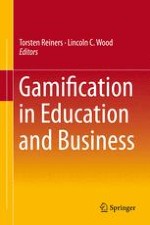2015 | OriginalPaper | Buchkapitel
14. From Market Place to Collusion Detection: Case Studies of Gamification in Education
verfasst von : Pinata Winoto, Tiffany Y. Tang
Erschienen in: Gamification in Education and Business
Aktivieren Sie unsere intelligente Suche, um passende Fachinhalte oder Patente zu finden.
Wählen Sie Textabschnitte aus um mit Künstlicher Intelligenz passenden Patente zu finden. powered by
Markieren Sie Textabschnitte, um KI-gestützt weitere passende Inhalte zu finden. powered by
